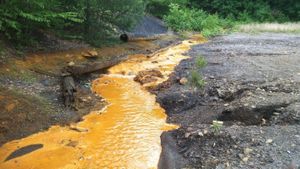The 2025 German Federal Election has left many pondering the future of the country's political dynamics, especially in North Rhine-Westphalia (NRW), where results indicate significant shifts among established parties. The elections, humorously dubbed as decisive by some observers, took place on February 23, 2025, leading to extensive reactions the following day.
Key outcomes show rising support for the Left Party (Die Linke), contrasting sharply with the Free Democratic Party's (FDP) losses, which political analysts have described as unprecedented. Ellen Ehni, WDR-Journalistin, remarked, "NRW has spoken, and the results are unprecedented," emphasizing the need for reflection among the parties involved.
Voter turnout was bolstered by younger populations eager for change, with reports indicating they leaned heavily toward progressive options. Susanna Zdrzalek from WDR observed, "Young voters demonstrated their commitment to change the system." This trend suggests not only changing preferences but also highlights the urgency for traditional parties to adapt to new voter expectations.
The backdrop of this electoral contest saw complex sentiments, with many voters expressing dissatisfaction with the previous government's actions. Reports from inside NRW painted a mixed picture: traditional strongholds showed surprising shifts, most prominently within urban areas like Arnsberg and sections of the Ruhr, where the SPD and AfD saw fluctuated support. Among these developments were concerns voiced by FDP representatives who stated, "It is clear we need to learn from this setback," pointing to their diminished influence.
Polling data collected during the election indicated potential coalition formations, stirring debate among party leaders on how they could navigate the new political terrain. Discussions focusing on coalitions particularly illuminated the complexity of reaching agreements among the various parties this time around. Claudia Roelvinck, reporting on the dynamics within Berlin, noted, "Coalition talks will be complex and challenging this time," hinting at the potential for unpredictable alliances.
With such substantial changes, the results not only reflect immediate political repercussions but also long-term shifts expected to affect governance structures across Germany. Analysts and political commentators have begun speculating on the degree to which this election could alter existing frameworks and coalition agreements, stressing the importance of adaptability.
Looking forward, potential coalitions remain fraught with challenges, as some leaders have expressed cautious optimism about the way forward. Julie Kurz's insights reveal, "The mood among our supporters is cautiously optimistic,” indicating a slight silver lining among the clouds of uncertainty. This sentiment resonates strongly as key political players prepare for negotiations.
The long-term ramifications following these results could reshape Germany's political scene considerably. Voter behavior, particularly among the youth and urban constituents, will likely influence parties’ strategies going forward, pushing them to reconsider their platforms to align with shifting voter priorities.
Indeed, the outcomes of the 2025 federal elections compel stakeholders to rethink their approaches and address the changing political climate decisively. With the recent elections, Germany stands on the precipice of potentially significant political transformations, marking this election not just as another chapter but perhaps as the dawn of new political realities.



